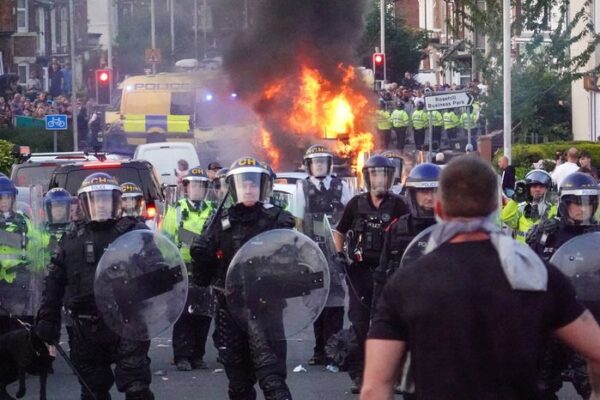Where faith is attacked or the freedom to express faith or faiths are pitted against another creating division and discord, the Islamic responsibility is to protect religious freedom and unity.
Friday Sermon: What are the priorities of the Muslim voter and how do the UK parties compare?
Where faith is attacked or the freedom to express faith or faiths are pitted against another creating division and discord, the Islamic responsibility is to protect religious freedom and unity.
Sermons 1-4 looked at how Islam provides support to a society, encourages political engagement, promotes distributive justice, and creates a hierarchy of priorities of Islamic values by which to judge political party manifestos.
Accordingly, it was argued that with global warming and the sale of arms to rogue and repressive nations causing the greatest harm to human life and social order on a global scale, combating these are the first two priorities for the Muslim voter.
In this discussion, we will continue with assessing our priorities and how the major political parties have responded.
The hierarchy of needs, known as the Maqasid as-Shari’ah, prioritises that Islam protects faith. This is not just the faith of the Muslim but also the faith of all, that there is an environment in which belief in God and the moral vision of Islam can flourish. Where this is threatened, Islam must prioritise its response. This is the third priority.
Importantly this means, where faith is attacked or the freedom to express faith or faiths are pitted against another creating division and discord, the Islamic responsibility is to protect religious freedom and unity.
It is well known that Muslim youth are having their identities attacked. Many fear expressing their religiosity in school or public for fear of reprisal. Indeed this isn’t limited to Muslims only but anti-Semitism and racism are again on the rise – especially in a post Brexit referendum which, arguably, was nothing more than an appeal to the Far Right and a soft-peddling of their narratives.
Accusations of anti-Semitism and Islamophobia being present in both mainstream parties are rife. The Muslim citizen is responsible to vote in such a way that the protection and freedom of religion is guaranteed and that the party can not only remove systemic prejudice from its ranks, but demonstrate a plan for healing the country’s wounds. The Muslim voter is therefore responsible to protect more than just his own faith but that of ALL faiths.
Let us review what the leaders of both mainstream parties have been accused of.
The Guardian newspaper writes:
Has Labour seen departures over the issue of antisemitism?
Yes. The Jewish Labour MPs Louise Ellman and Luciana Berger both left the party, citing antisemitic abuse and bullying, while others who quit cited solidarity with their Jewish colleagues as a factor in their decision.
For example, 635 complaints were made in the first six months of 2019, which resulted in eight expulsions from the party during that time period.
Has Corbyn himself been criticised over antisemitism?
Yes, particularly his record when he was a backbencher. For example, Corbyn has said he regrets calling members of Hamas and Hezbollah “friends” at a meeting in parliament in 2009. Last year, he accepted he had made a mistake by supporting a graffiti artist after his work, featuring several known antisemitic tropes, was removed from a wall in east London after complaints. [1]
The Prime Minister, Boris Johnson, on the other hand, has made a series of racist and Islamophobic comments across his career. Let us mention just a few of them:
“Islam inherently inhibits the path to progress and freedom.” (2006)
“There must be something about Islam that helps to explain why there was no spread of democracy in the Muslim world.” (2007)
“What is going on in these Mosques and Madrasas? When is someone going to get 18th Century on Islam’s medieval a**?” (2005)
“To any non-Muslim reader of the Koran Islamophobia seems a natural reaction and exactly what that text is meant to provoke.” (2005)
“The problem is Islam. Islam is the problem.” (2005)
“It is absolutely ridiculous that people choose to go round looking like letterboxes.” (2018)
The Muslim community must look seriously at these two sets of examples and ask which leaders and parties have created racism and which have the plans to defeat hate and division.
The fourth priority is to protect the welfare and healthcare systems of the country. This includes living standards and mental health too. In this case we will focus purely on the NHS.
Grand Ayatollah Syed Mohammed Taqi al-Modarresi writes about the five levels of healthcare in a community. This is because wellness, prevention of disease, and treatment of ill health is from the tranquillity of the soul and needs guaranteeing. He states:
1: The minimum level of wellness is that which maintains the life of the soul and the survival of the body
2: The level that preserves the human being from fear of serious harm leading to, for example, general weakness, or a significant lack of human prowess
3: The level that maintains public health, which affects its loss in large corruption, such as the spread of deadly epidemics
4: The level of community protection from non-lethal epidemics and the preservation of the environment
5: The highest level of health protection, which ensures the safety of human beings of various diseases
He evidences this by a number of verses and narrations, for example:
( يَآ أَيُّهَا الَّذِينَ ءَامَنُوا اسْتَجِيبُوا لِلّهِ وَلِلرَّسُولِ إِذَا دَعَاكُمْ لِمَا يُحْيِيكُمْ وَاعْلَمُوا اَنّ اللّهَ يَحُولُ بَيْنَ الْمَرْءِ وَقَلْبِهِ وَاَنَّهَُ إِلَيْهِ تُحْشَرُونَ( (الانفال/24)
( وَمِنْهُمْ مَن يَقُولُ رَبَّنَآ ءَاتِنَا فِي الدُّنْيَا حَسَنَةً وَفِي الاَخِرَةِ حَسَنَةً وَقِنَا عَذَابَ النَّارِ( (البقرة/201)
( يَآ أَيُّهَا الَّذِينَ ءَامَنُوا لاَ تَأْكُلُوا أَمْوَالَكُم بَيْنَكُم بِالْبَاطِلِ إِلآَّ أَن تَكُونَ تِجَارَةً عَن تَرَاضٍ مِنْكُمْ وَلاَ تَقْتُلُوا أَنْفُسَكُمْ إِنَّ اللَّهَ كَانَ بِكُمْ رَحِيماً( (النساء/29)
( وَأَنْفِقُوْا فِي سَبِيلِ اللّهِ وَلاَ تُلْقُواْ بِاَيْدِيكُمْ إِلَى التَّهْلُكَةِ وَأَحْسِنُوا إِنَّ اللّهَ يُحِبُّ الْمُـحْسِنِينَ( (البقرة/195) تداووا ، فما أنزل الله داءً إلا أنزل معه دواءً “Medicate [properly]! For Allah has not revealed any disease except that He revealed with it, its cure.” [2]
This means that the Muslim community is responsible to protect and develop its healthcare system. As the Qur’an says “And cause not corruption upon the earth after its reformation” (7:56).
Therefore the question of the corporatisation, commodification, and the sale of the NHS as well as its maintenance and progression must also be at the top of the priorities of the Muslim vote. For further reading on each parties commitments to the NHS, refer to their manifestos.





